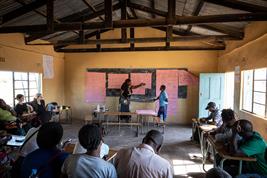15.10.2024

Social learning processes can play a crucial role in the sustainable management of natural resources, according to a new global study published in
Humanities and Social Sciences Communications. The Leibniz Centre for Agricultural Landscape Research (ZALF) coordinated the analysis, which reviewed 137 case studies from five continents. The researchers identified two primary types of social learning: endogenous and exogenous. The study highlights the advantages and disadvantages of each approach, revealing why endogenous learning is particularly effective in certain contexts.
Social learning describes how groups build knowledge and develop solutions together. Endogenous learning originates within communities and is grounded in local rationalities and experiences. Exogenous learning, on the other hand, is driven by external actors such as experts or organizations. Both approaches have their merits, but the study demonstrates that endogenous learning holds particular promise in addressing challenges in Global South regions.
Endogenous Learning: Sustainable Change from Within
Endogenous learning fosters deep, long-lasting change by drawing on local knowledge and traditions. In case studies mostly from the Global South, communities that relied on their own experiences were more likely to develop sustainable resource management solutions. This approach enhances the capacity of marginalized territories to respond to multifaceted crises.
“Endogenous learning works particularly well when communities can act autonomously,” explains Prof. Michelle Bonatti, lead author of the study and researcher at ZALF. “It’s based on shared experiences and leads to solutions that are locally adapted and sustainable in the long term.”
Exogenous Learning: Benefits and Challenges of External Expertise
Exogenous learning brings valuable external knowledge and innovations that can complement local practices. However, it can face resistance when outside solutions do not align with local conditions. The study found that in Global South regions, exogenous learning is often hindered by power imbalances, as external actors may not fully understand or respect the community’s social and cultural context.
“Exogenous learning offers new perspectives but can struggle when local communities feel their experiences are overlooked,” says Prof. Dr. Bonatti. “Close collaboration with local actors is crucial to fostering trust and enhancing the learning process.”
Why Endogenous Learning Succeeds
The study highlights that endogenous learning is particularly beneficial in marginalized communities in the Global South, where external actors often face skepticism. Endogenous learning strengthens community-based approaches that rely on collective action and participatory decision-making. It becomes a catalyst for social justice and sustainable development by leveraging local resources and knowledge rather than undermining them.
Looking Ahead: The Role of Social Learning in Sustainable Resource Management
The study underscores the importance of further research into social learning processes. Future projects should focus on understanding the long-term impacts of endogenous learning on sustainable resource management and developing methods to support these processes. There is also a need to critically assess the role of external actors in social learning and to explore how endogenous and exogenous learning can be effectively combined.
“Our analysis shows that social learning processes not only share knowledge but also foster trust and cooperation within communities. This is crucial for developing sustainable solutions, especially in rural regions of the Global South,” emphasizes Prof. Michelle Bonatti.
Project partner:
- Leibniz Centre for Agricultural Landscape Research (ZALF) (Germany)
- Resource Economics Group, Humboldt University of Berlin (Germany)
- Crop Production Ecology, Swedish University of Agricultural Sciences (Sweden)
- Hasso Plattner Institute, University of Potsdam (Germany)
- Department of Community Energy and Adaptation to Climate Change, Technische Universität Berlin (Germany)
- Helmholtz Centre for Environmental Research (UFZ) (Germany)
- WWF Mediterranean Marine Initiative (Italy)
- Vila Velha University (Brazil)
- Education Department, Florianópolis City Hall (Brazil)
- Leibniz Institute for Agricultural Engineering and Bioeconomy (ATB) (Germany)
- Federal University of Santa Catarina (Brazil)
- Applied Systems Thinking in Practice Research Group, The Open University (UK)
- IRRI CGIAR International Rice Research Institute (Philippines)
- GGRIAR CGIAR Climate Security Office
- French National Research Institute for Sustainable Development (IRD), UMR DIADE, University of Montpellier (France)
- Centre for Regional Studies on Adaptation to Drought (CERAAS), Laboratoire Mixte International (Senegal)
- French National Research Institute for Sustainable Development (IRD), UMR Espace-Dev, University of Montpellier (France)
- AR4D Knowledge Sharing Consultant (UK)
Funding:
Open Access funding enabled and organized by the DEAL project.
Further Information:
Text disclaimer:
This is a summary created with the help of artificial intelligence: Bonatti, M., Lana, M., Medina, L. et al. (2024). Global analysis of social learning’s archetypes in natural resource management: understanding pathways of co-creation of knowledge. Humanities and Social Sciences Communications.
https://www.nature.com/articles/s41599-024-03590-5, published under CC BY 4.0
https://creativecommons.org/licenses/by/4.0/.
The text has been carefully reviewed and revised in the light of AI regulations at ZALF.
